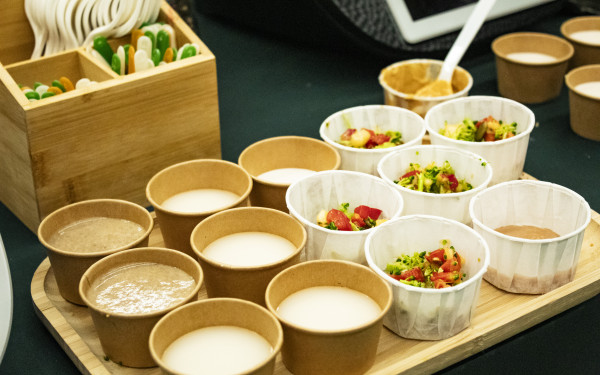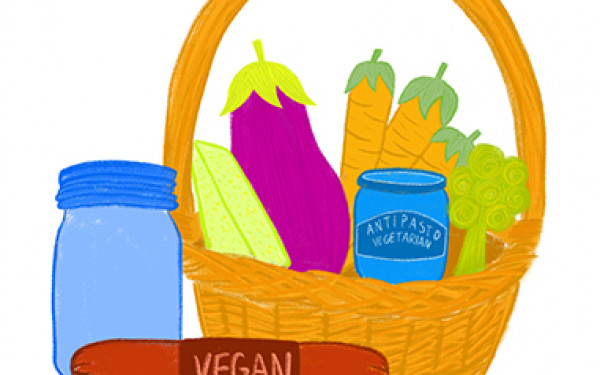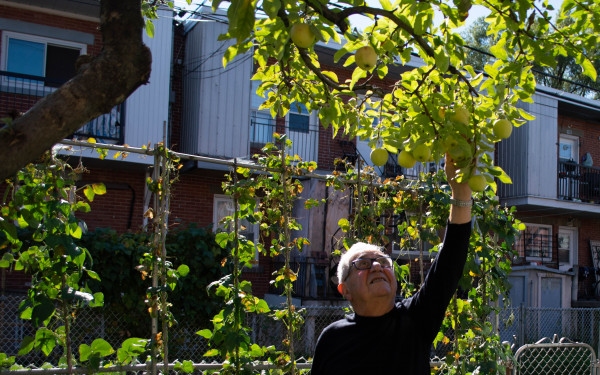Building community through food production
How a Concordia PhD student is working to integrate refugee women into Bâtiment 7’s urban agriculture project
Food possesses an extraordinary power to unite strangers around a shared affinity. Specific flavours and ingredients can bring a sense of home when abroad. Food is meant to be shared with family and community.
This love for food and feeling of community is just what the people behind Bâtiment 7 envisioned for their small urban farm, the Fermette project.
“Part of the goal of Bâtiment 7 is to contribute to fostering a local and inclusive food system,” said Joseph Bergeron, project coordinator for Bâtiment 7, so they created an agriculture project designed to enhance food autonomy in Pointe-Saint-Charles.
A former industrial site, Bâtiment 7 is now a communal place where diverse community-oriented projects, workshops, and events take place. The collective 7 à Nous is charged with preserving this environment and enhancing local involvement and kinship. Bâtiment 7 aspires to drive a social, environmental, cultural, political, and economic transformation within the neighborhood.
The Fermette project
The Fermette is a year-old community project involving several organizations, including Bâtiment 7, Action Gardien, the Club Populaire des consommateurs de PSC, Épicerie Le Détour, and 7 à Nous.
Research around financing and resources for the project began in fall 2019. It is important the project encompasses the whole process of food from its production to transformation and conservation, followed by the sale of the product and finishing with the composting and recycling of agricultural waste.
Permaculture has been chosen as the most sustainable cultivation method. This entails the selection of adequate crops using each other’s nutrients to grow them properly without the use of external chemicals. Today, the Fermette project is composed of a greenhouse, an orchard, medicinal plants, a henhouse, and community areas managed by volunteers and local organizations.
“The COVID pandemic served as a wakeup call about food sovereignty, and people are getting more aware,” – Zeina El Omari
Involving refugee women
This project took a step further in its social impact in part thanks to Zeina El Omari, an MA candidate and soon-to-be PhD candidate in the individualized program at Concordia, who in spring suggested including women refugees in the project.
When she arrived in Canada, El Omari was missing the contact with nature she had in France and Lebanon. She began her agricultural journey 16 years ago in her garden where she created a forêt nourricière, functioning as a real ecosystem sourcing its energy and nutrients from the surrounding plants and even facing predators such as cats or squirrels.
While she was doing her individualized program at Concordia, she had the opportunity to take part in the Living Labs initiative at Concordia. This initiative is a funding strategy that was created in partnership with Concordia’s Office of Community Engagement and the Sustainability Action Fund. It was through this that she discovered the Fermette project.
El Omari is part of what is called feminist active participatory research, meaning she is not only studying and trying to come up with theories, but she actually wants to see the transformation take place.
The idea of including women refugees started with Zeina being a research assistant for assistant professor Natalie Kouri-Towe of Concordia, who studies critical refugee studies with a focus on Syrian refugees.
Their research focuses on the refugees sponsored by the government who are usually coming from lower social classes. Women are often in charge of cultivating the land, therefore holding an important place in the family’s organization and economy.
To include women refugees in the agricultural cycle, the coordinators plan to provide them with other knowledge through the implementation of specific workshops. “But those workshops are not functioning as a school as those women, who already possess their own savoir-faire. We just want to enable them to use their existing know-how while helping them to give a new purpose in their life when coming to Canada,” said El Omari.
The first step is for the women to learn more about permaculture and North American crops, then to focus on the storage, cooking, or fermentation of the harvest in the kitchen within the Bâtiment 7 site.
Finally, the coordinators wish to give them the necessary expertise to start a small business or to reproduce the concept in other communities around Montreal in the future. Talks are ongoing with microfinance organizations to provide the necessary resources.
The production is already in part sold at the Bâtiment 7 non-profit grocery store, Le Detour, and there are plans to sell to other nearby stores.
The ambition is to give refugee women the tools to integrate their new community properly while not forgetting about their culture. Indeed, they should not leave their home culture aside but bring their knowledge into the project as well.
Upcoming challenges
The pandemic provided the necessary time to reach out to refugee organizations, microfinance organizations, and people with adequate agricultural or cooking skills, but it also delays the workshops. Most refugees do not live near Bâtiment 7 or possess the technological equipment to follow the workshops if they were online. El Omari hopes these will be underway by summer.
The Fermette is a pilot project that will help the agricultural component of Bâtiment 7 flourish, said Bergeron. The next step is to work with the City of Montreal to develop adjacent land, known as lot 5, to create a larger agricultural space and be more autonomous.
This community project is all about making new kinships and restoring the feeling of home while creating a sustainable ecosystem within Montreal—thanks to the unique power of food.
“There is an extraordinary enthusiasm that I was not expecting at all about this project when reaching out to refugee organizations,” said El Omari. “The COVID pandemic served as a wakeup call about food sovereignty, and people are getting more aware.”
Correction: A previous version of this article misidentified Zeina El Omari as a PhD student. In fact, she is currently an MA candidate in the individualized program. She will enter a PhD program in January 2021.
This article originally appeared in The Food Issue, published November 3, 2020.







